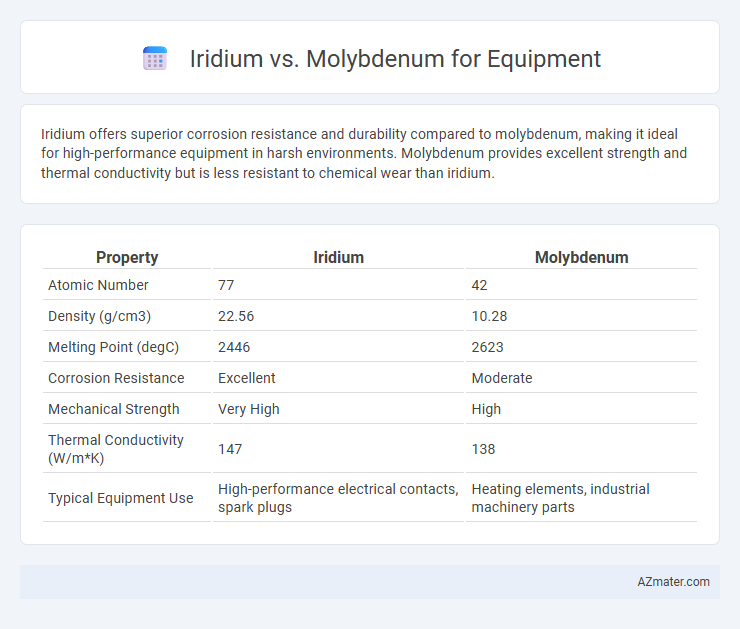Iridium offers superior corrosion resistance and durability compared to molybdenum, making it ideal for high-performance equipment in harsh environments. Molybdenum provides excellent strength and thermal conductivity but is less resistant to chemical wear than iridium.
Table of Comparison
| Property | Iridium | Molybdenum |
|---|---|---|
| Atomic Number | 77 | 42 |
| Density (g/cm3) | 22.56 | 10.28 |
| Melting Point (degC) | 2446 | 2623 |
| Corrosion Resistance | Excellent | Moderate |
| Mechanical Strength | Very High | High |
| Thermal Conductivity (W/m*K) | 147 | 138 |
| Typical Equipment Use | High-performance electrical contacts, spark plugs | Heating elements, industrial machinery parts |
Introduction to Iridium and Molybdenum
Iridium, a rare and corrosion-resistant transition metal, offers exceptional durability and high melting points valuable for harsh equipment environments. Molybdenum, known for its excellent strength and thermal conductivity, enhances equipment performance in high-temperature and high-pressure applications. Both metals serve critical roles in manufacturing industrial and specialized equipment due to their unique mechanical and chemical properties.
Key Properties Comparison: Iridium vs Molybdenum
Iridium offers exceptional corrosion resistance and high melting point (2446degC), making it ideal for equipment exposed to extreme temperatures and harsh chemical environments. Molybdenum, with a melting point of 2623degC and excellent tensile strength, provides superior structural stability under high mechanical stress. While iridium excels in durability and oxidation resistance, molybdenum is preferred for its cost-effectiveness and thermal conductivity in demanding industrial applications.
Mechanical Strength and Durability
Iridium exhibits superior mechanical strength and exceptional durability, making it ideal for high-stress equipment applications that demand resistance to wear and corrosion. Molybdenum offers a balanced combination of toughness and flexibility, with notable high-temperature strength but lower corrosion resistance compared to iridium. Equipment utilizing iridium outperforms in harsh environments, while molybdenum is preferred for applications requiring lighter weight and cost-effective strength.
Corrosion and Oxidation Resistance
Iridium exhibits exceptional corrosion and oxidation resistance, particularly in harsh chemical environments and high temperatures, making it ideal for long-lasting equipment exposed to aggressive conditions. Molybdenum also offers good resistance to oxidation and corrosion but performs best in moderately corrosive environments and at elevated but lower temperatures compared to iridium. When selecting materials for equipment, iridium's superior stability under extreme conditions outweighs molybdenum's cost-effectiveness and mechanical strength in less severe applications.
Thermal and Electrical Conductivity
Iridium exhibits superior thermal stability and corrosion resistance, making it ideal for high-temperature equipment, while molybdenum offers excellent thermal conductivity, enhancing heat dissipation in industrial applications. Electrically, molybdenum provides higher conductivity than iridium, which is beneficial for electrical contacts and electrodes requiring efficient current flow. The choice between iridium and molybdenum hinges on balancing thermal endurance with electrical conductivity based on the specific equipment demands.
Cost and Material Availability
Iridium offers exceptional corrosion resistance and durability for specialized equipment but comes with a significantly higher cost and limited availability due to its rarity and complex extraction process. Molybdenum is more cost-effective and abundantly available, providing good strength and temperature resistance suitable for large-scale industrial applications. Choosing between iridium and molybdenum involves balancing budget constraints with performance requirements and material accessibility.
Application Suitability in Equipment Manufacturing
Iridium offers exceptional corrosion resistance and high melting point, making it ideal for equipment exposed to extreme temperatures and harsh chemical environments, such as aerospace and medical devices. Molybdenum provides strength and thermal conductivity at a lower cost, commonly used in structural components, electrical contacts, and heat exchangers. Equipment manufacturers select iridium for niche, high-performance applications requiring durability, while molybdenum suits broader industrial uses balancing performance and cost-efficiency.
Environmental and Safety Considerations
Iridium offers superior corrosion resistance and high-temperature stability, reducing the risk of equipment degradation and hazardous material release, making it ideal for harsh environmental conditions. Molybdenum, while cost-effective and strong, can oxidize and pose respiratory hazards during handling, requiring stringent safety protocols. Selecting iridium enhances equipment longevity and minimizes environmental impact, whereas molybdenum demands careful monitoring to mitigate potential safety and ecological risks.
Industry Case Studies: Iridium vs Molybdenum
Iridium offers superior corrosion resistance and high-temperature stability compared to molybdenum, making it ideal for aerospace and chemical processing equipment exposed to extreme conditions. Industry case studies highlight iridium's long-term durability in catalytic converters and electrical contacts, whereas molybdenum is favored for its cost-effectiveness and strength in steel alloys and industrial machinery components. Energy and electronics sectors demonstrate iridium's advantage in niche applications requiring exceptional wear resistance, while molybdenum remains essential in bulk manufacturing due to its thermal conductivity and affordability.
Conclusion: Selecting the Right Material for Equipment
Iridium offers exceptional corrosion resistance and high-temperature stability, making it ideal for equipment used in extreme environments, while molybdenum provides excellent strength and thermal conductivity with better cost efficiency for general industrial applications. Selecting the right material depends on specific operational conditions such as exposure to corrosive agents, temperature ranges, and budget constraints. For highly specialized, corrosive, or high-temperature equipment, iridium is preferred; for robust, high-strength applications where cost and machinability are important, molybdenum is the optimal choice.

Infographic: Iridium vs Molybdenum for Equipment
 azmater.com
azmater.com